HSK5级 书写讲解
- 格式:ppt
- 大小:1.60 MB
- 文档页数:85
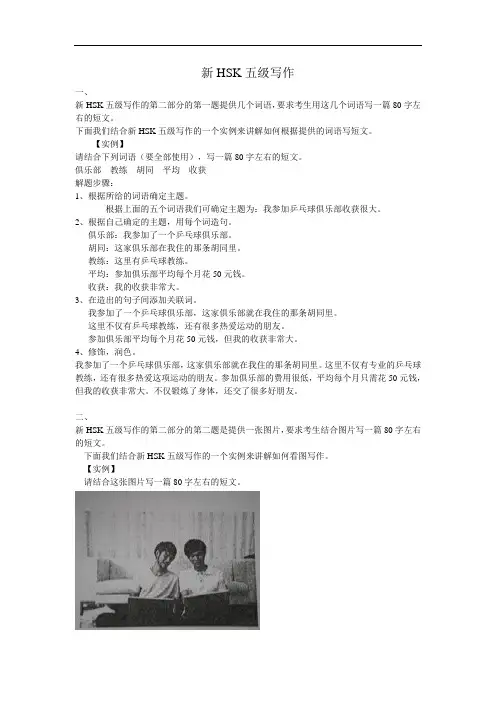
新HSK五级写作一、新HSK五级写作的第二部分的第一题提供几个词语,要求考生用这几个词语写一篇80字左右的短文。
下面我们结合新HSK五级写作的一个实例来讲解如何根据提供的词语写短文。
【实例】请结合下列词语(要全部使用),写一篇80字左右的短文。
俱乐部教练胡同平均收获解题步骤:1、根据所给的词语确定主题。
根据上面的五个词语我们可确定主题为:我参加乒乓球俱乐部收获很大。
2、根据自己确定的主题,用每个词造句。
俱乐部:我参加了一个乒乓球俱乐部。
胡同:这家俱乐部在我住的那条胡同里。
教练:这里有乒乓球教练。
平均:参加俱乐部平均每个月花50元钱。
收获:我的收获非常大。
3、在造出的句子间添加关联词。
我参加了一个乒乓球俱乐部,这家俱乐部就在我住的那条胡同里。
这里不仅有乒乓球教练,还有很多热爱运动的朋友。
参加俱乐部平均每个月花50元钱,但我的收获非常大。
4、修饰,润色。
我参加了一个乒乓球俱乐部,这家俱乐部就在我住的那条胡同里。
这里不仅有专业的乒乓球教练,还有很多热爱这项运动的朋友。
参加俱乐部的费用很低,平均每个月只需花50元钱,但我的收获非常大。
不仅锻炼了身体,还交了很多好朋友。
二、新HSK五级写作的第二部分的第二题是提供一张图片,要求考生结合图片写一篇80字左右的短文。
下面我们结合新HSK五级写作的一个实例来讲解如何看图写作。
【实例】请结合这张图片写一篇80字左右的短文。
解题步骤:1、仔细地观察图上的画面,看清图上画的是发生在什么时间、什么地方的事。
从图上两个男青年(更准确的应该是两个好朋友吧)在一起用电脑,背景是窗帘、沙发,很肯定的是家里的摆设,所以我们定下作文的时间和事件:两个朋友在家里一起用电脑。
2、画面上有哪些人、哪些景和哪些物?注意观察人的服饰、容貌、年龄、身份、表情、动作,并给主要人物取名。
画面上有两个人,两个男人都着便装,他们对着电脑屏幕在一起讨论,很随意地坐在沙发的前边,脸上是愉悦的表情。
3、合理想象。

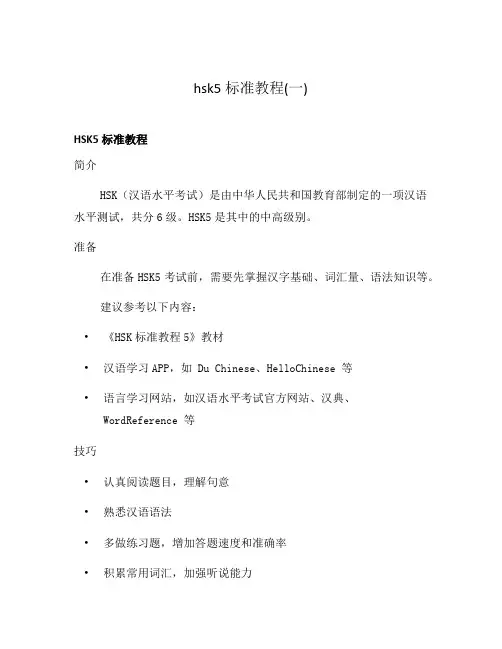
hsk5标准教程(一)HSK5标准教程简介HSK(汉语水平考试)是由中华人民共和国教育部制定的一项汉语水平测试,共分6级。
HSK5是其中的中高级别。
准备在准备HSK5考试前,需要先掌握汉字基础、词汇量、语法知识等。
建议参考以下内容:•《HSK标准教程5》教材•汉语学习APP,如 Du Chinese、HelloChinese 等•语言学习网站,如汉语水平考试官方网站、汉典、WordReference 等技巧•认真阅读题目,理解句意•熟悉汉语语法•多做练习题,增加答题速度和准确率•积累常用词汇,加强听说能力•注意时间分配,不要过分耽搁于某一题目考试内容词汇HSK5词汇量要求达到2500个,包括基础词汇和扩展词汇。
常见考点有:•同义词、反义词•动宾短语•四字熟语等语法HSK5语法要求掌握相对复杂的句式和语法知识,常见考点有:•趋势补语•独立主格结构•前后句衔接等阅读HSK5阅读要求阅读难度较高的文章或文段,对语言表达细节、含义等进行深入理解和分析。
常见考点有:•短文阅读•文章主题•排序等听力HSK5听力测试考察听取较长的对话、独白,理解其主要内容、内涵和涉及的信息。
常见考点有:•短对话•长对话•短文投影等写作HSK5写作要求能够用汉语表达一些复杂的思想和语言细节,常见考点有:•作文•书信•日记等总结通过上述内容的学习,可以为备考HSK5提供一定的指导和帮助。
记得在备考过程中合理分配时间,多做练习题和模拟考试,掌握应试技巧。
祝各位考生取得优异的成绩!模拟题目以下是几道HSK5考试的模拟题目。
词汇部分1.下列词语中属于动宾短语的是:A. 坐飞机B. 做梦C. 看电影D. 喝水2.下列词语中属于同义词的是:A. 牛仔裤、裤子B. 做饭、烧菜C. 漂亮、美丽D. 学生、学员语法部分3.下列句子中属于独立主格结构的是:A. 他看了一本有趣的小说,心情很舒畅。
B. 李老师发现学生们的进步很明显,她高兴得合不拢嘴。
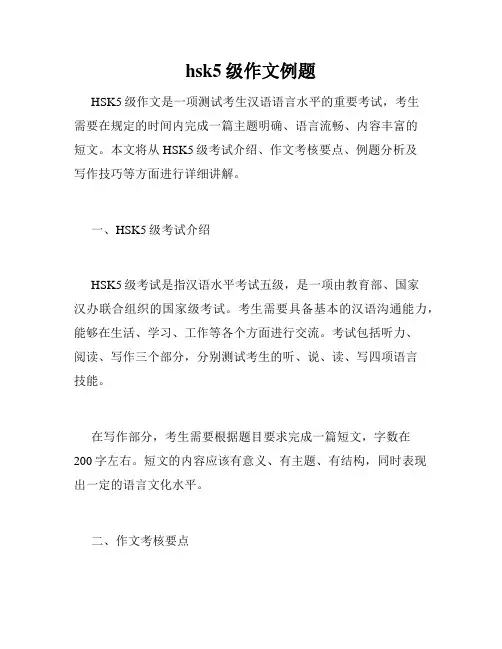
hsk5级作文例题HSK5级作文是一项测试考生汉语语言水平的重要考试,考生需要在规定的时间内完成一篇主题明确、语言流畅、内容丰富的短文。
本文将从HSK5级考试介绍、作文考核要点、例题分析及写作技巧等方面进行详细讲解。
一、HSK5级考试介绍HSK5级考试是指汉语水平考试五级,是一项由教育部、国家汉办联合组织的国家级考试。
考生需要具备基本的汉语沟通能力,能够在生活、学习、工作等各个方面进行交流。
考试包括听力、阅读、写作三个部分,分别测试考生的听、说、读、写四项语言技能。
在写作部分,考生需要根据题目要求完成一篇短文,字数在200字左右。
短文的内容应该有意义、有主题、有结构,同时表现出一定的语言文化水平。
二、作文考核要点HSK5级作文考核的主要要点有三个:1. 主题鲜明,内容全面作文应该有明确的主题,全面地展现出该主题所涉及的方面。
考生需要注意概括主题,理清思路,语言结构清晰,内容丰富,符合题目要求。
2. 语言流畅,表达准确HSK5级考试要求考生的语言流利,表达准确。
在写作中要注意遣词造句的准确性和语言文化的合理性,注意语法结构的使用和词汇搭配的准确性。
3. 思路连贯,层次清晰写作中的思路应该连贯,层次清晰。
考生需要注意逻辑性,把握层次结构,进行适当的分段和结构调整,让读者能够轻松理解文章的主旨。
三、例题分析以下是一道HSK5级作文例题:题目:写一篇文章,讲述一位你尊敬的人。
请描述这个人的性格、为人处事方式以及影响你的方面。
以上题目要求考生写一篇短文,讲述自己尊敬的人,表达出这个人的性格特点、为人处事的方式以及对自己的影响。
考生在写作时,首先需要围绕这个人的性格特点作为主题来展开,这个性格特点可以是爱心、坚韧、努力等,可以从方方面面来展示这种性格特点,让读者能够深刻地感受到这个人的品质。
其次,考生需要逐步描述这个人的为人处事方式,这个人的处世方式可以是诚信、勤奋、独立等等,需要详细地描述这些方式是如何体现在这个人的行为中的。
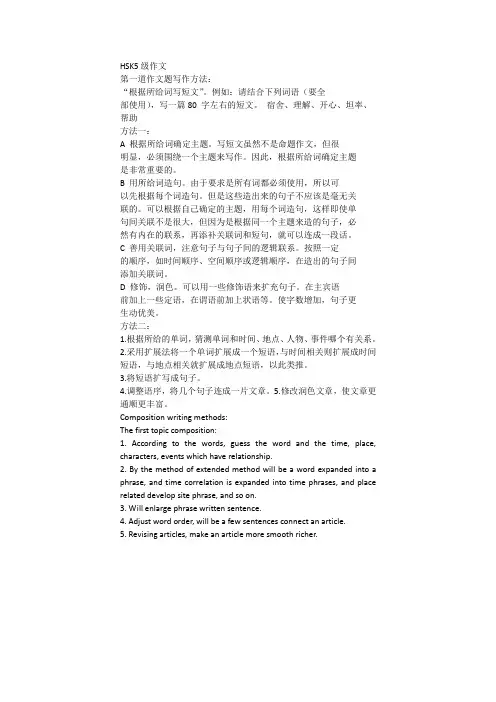
HSK5级作文第一道作文题写作方法:“根据所给词写短文”。
例如:请结合下列词语(要全部使用),写一篇80 字左右的短文。
宿舍、理解、开心、坦率、帮助方法一:A 根据所给词确定主题。
写短文虽然不是命题作文,但很明显,必须围绕一个主题来写作。
因此,根据所给词确定主题是非常重要的。
B 用所给词造句。
由于要求是所有词都必须使用,所以可以先根据每个词造句。
但是这些造出来的句子不应该是毫无关联的。
可以根据自己确定的主题,用每个词造句,这样即使单句间关联不是很大,但因为是根据同一个主题来造的句子,必然有内在的联系,再添补关联词和短句,就可以连成一段话。
C 善用关联词,注意句子与句子间的逻辑联系。
按照一定的顺序,如时间顺序、空间顺序或逻辑顺序,在造出的句子间添加关联词。
D 修饰,润色。
可以用一些修饰语来扩充句子。
在主宾语前加上一些定语,在谓语前加上状语等。
使字数增加,句子更生动优美。
方法二:1.根据所给的单词,猜测单词和时间、地点、人物、事件哪个有关系。
2.采用扩展法将一个单词扩展成一个短语,与时间相关则扩展成时间短语,与地点相关就扩展成地点短语,以此类推。
3.将短语扩写成句子。
4.调整语序,将几个句子连成一片文章。
5.修改润色文章,使文章更通顺更丰富。
Composition writing methods:The first topic composition:1. According to the words, guess the word and the time, place, characters, events which have relationship.2. By the method of extended method will be a word expanded into a phrase, and time correlation is expanded into time phrases, and place related develop site phrase, and so on.3. Will enlarge phrase written sentence.4. Adjust word order, will be a few sentences connect an article.5. Revising articles, make an article more smooth richer.作文第二题:“根据图片写短文”如果是人物图片:1.根据人物的主要动作先写出最简单的一个句子;2.再从动作、表情、外貌、心理、语言等几个方面进行人物描绘;3. 猜测关系。


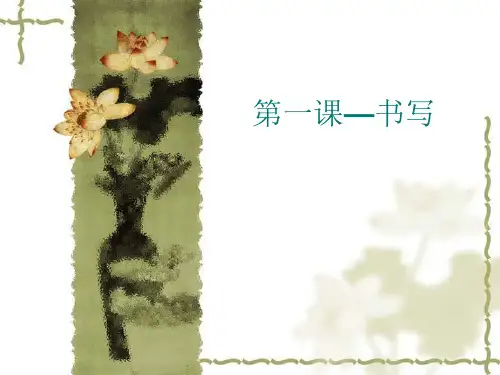

h s k5级语序篇做题技巧(一)了解词性、词义在做该类问题时,词性是基本,而词义可相对退后,作为辅助。
因为留学生不会掌握所有的词汇含义,所以在这种情况下,可以根据词性进行筛选,尽量避免错误发生,提高做题准确率。
例如:哭了突然起来他→他突然哭了起来。
技巧:首先,“他”是主语,最先排除。
第二,表示程度词“起来”的前面应该是“而“突然”是“adv.”,所以,应该是“哭了起来”。
从中我们可以知道,该部分应该了解词性,从而可以提高准确率。
例如:要求我们提出的痛快地队长答应了→ 队长痛快地答应了我们提出的要求。
技巧:“痛快地”是“adj.”,后面应该加“v.”,所以我们看出是“痛苦地答应了”或者“痛快地要求”,但是“要求”是被提出、说出的,所以最后的组合是“痛快地答应了”。
该部分也是属于应该了解词义词性。
(二)了解词的固定搭配、常用用法同该部分的“方法一”作用相同,在碰到无法选择顺序时,除了根据词性,还可以根据固定搭配及常用搭配进行筛选排序。
而且,固定搭配在平时课堂中就是作为重要部分学习,所以更应该掌握。
例如:1. 关系也一点儿没有→ 我们一点儿关系也没有。
技巧:首先就应该看到“也”和“一点儿”,这两个词属于固定搭配“一点儿······也······”,同时还应该知道,“一点儿······也······”+否定词,所以最后就知道了“一点儿······也没有”。
例如:2.今天看法报纸出版的专家的报道了>→ 今天出版的报纸报道了专家的看法。
技巧:找到主语,“今天”;“看法”一般是人的想法,所以是“专家的看法”;“报纸”出来的v.是“出版”,而且“的”的后面一定是n.,所以是“出版的报纸”,该部分可以提现固定搭配和常用用法。

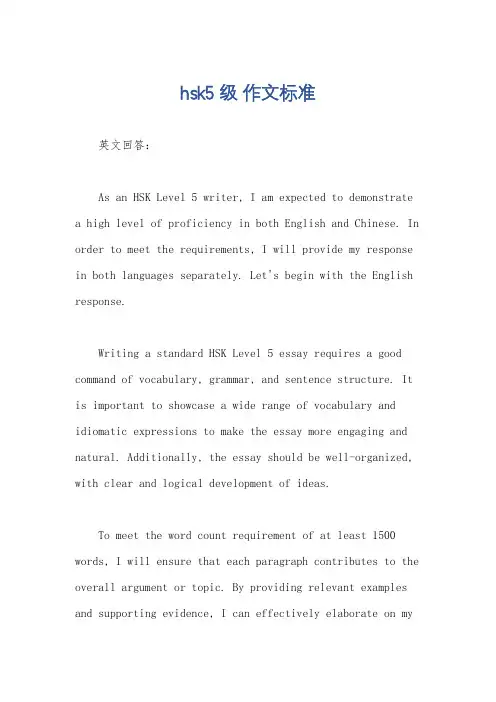
hsk5级作文标准英文回答:As an HSK Level 5 writer, I am expected to demonstrate a high level of proficiency in both English and Chinese. In order to meet the requirements, I will provide my response in both languages separately. Let's begin with the English response.Writing a standard HSK Level 5 essay requires a good command of vocabulary, grammar, and sentence structure. It is important to showcase a wide range of vocabulary and idiomatic expressions to make the essay more engaging and natural. Additionally, the essay should be well-organized, with clear and logical development of ideas.To meet the word count requirement of at least 1500 words, I will ensure that each paragraph contributes to the overall argument or topic. By providing relevant examples and supporting evidence, I can effectively elaborate on mypoints and demonstrate a thorough understanding of the topic.Furthermore, it is essential to avoid repetitivephrases and unnatural keyword placement. Instead, I will strive to use a variety of transition words and phrases to connect ideas and maintain coherence throughout the essay. This will help to create a smooth flow of thoughts and prevent the essay from sounding monotonous.In conclusion, writing an HSK Level 5 essay involves showcasing a high level of language proficiency, utilizinga wide range of vocabulary and idiomatic expressions, organizing ideas logically, and avoiding repetitive phrases. By adhering to these guidelines, I can produce a well-structured and engaging essay that meets the standards of HSK Level 5.中文回答:作为一个HSK5级的写作者,我需要展示出对英语和汉语的高水平运用。
书写题型评分说明一、书写的评分过程是:首先,将评分员所给分数转换为标准分;其次,将标准分转换为书写分测验新HSK分数。
二、书写的评分标准如下:1、HSK(三级)完成句子5*12=60 写汉字5*8=40 合计1002、HSK(四级)完成句子10*6=60 看图用词造句5*8=40 合1003、HSK(五级)完成句子8*5=40 写短文2*30=60 合计1004、HSK(六级)缩写1*100=100三、具体分值书写部分,我们分完成句子、写汉字、看图用词造句、写短文、缩写5种题型来介绍。
1、完成句子HSK(三级)、HSK(四级)、HSK(五级)中有“完成句子”题。
0分:空白。
低档分:未包含所提供的全部词语;词序排列不正确;有3个或3个以上错别字。
中档分:词序排列基本正确但增加了未提供词;词序排列正确但有1-2个错别字。
高档分:包含全部词语且词序排列正确,无错别字。
2、写汉字题HSK(三级)中有“写汉字”题。
0分:空白或写了与答案完全不相关的字。
中档分:与答案相近,是错字。
高档分:与答案一致。
3、看图用词造句HSK(四级)中有“看图用词造句”题。
0分:空白。
低档分:内容与图片及所提供的词语无关;有3个或3 个以上错别字;句子不完整,有语法错误。
中档分:句子完整、无语法错误但有1-2 个错别字;句子完整、无语法错误但内容简单。
高档分:句子完整、无错别字、无语法错误且内容丰富。
4、写短文HSK(五级)中有“写短文”题。
我们分第99题和第100题来介绍。
第99题0分:空白。
低档分:未全部使用5个词语,内容不连贯,有语法错误;有较多错别字。
中档分:内容连贯且合逻辑,有语法错误;内容连贯且合逻辑,有少量错别字;内容连贯且合逻辑,篇幅不够。
高档分:5个词语全部使用,无错别字,无语法错误,内容丰富、连贯且合逻辑。
第100题0分:空白。
低档分:内容与图片相关性不大;内容不连贯,有语法错误;有较多错别字。
中档分:内容与图片相关且合逻辑,有语法错误;内容与图片相关且合逻辑,有少量错别字;篇幅不够。
阿姨 āyí maternal aunt; step-mother; childcare worker; nursemaid; woman of similar age to one's parents (term of address used by child);CL:個|个[ge4]啊 a modal particle ending sentence, showing affirmation, approval, orconsent唉 āi interjection or grunt of agreement or recognition (e.g. yes, it's me!); to sigh矮 ǎi low; short (in length)爱 ài to love; affection; to be fond of; to like爱好 àihào to like; to take pleasure in; keen on; fond of; interest; hobby; appetite for; CL:個|个[ge4]爱护 àihù to cherish; to treasure; to take care of; to love and protect爱情 àiqíng romance; love (romantic); CL:個|个[ge4]爱惜 àixīto cherish; to treasure; to use sparingly爱心 àixīn compassion; CL:片[pian4]安静 ānjìng quiet; peaceful; calm安排 ānpái to arrange; to plan; to set up安全 ānquán safe; secure; safety; security安慰 ānwèi to comfort; to console; CL:個|个[ge4]安装 ānzhuāng install; erect; fix; mount; installation岸 àn bank; shore; beach; coast; CL:個|个[ge4]暗 àn dark; gloomy; hidden; secret; muddled; obscure; in the dark按时 ànshí on time; before deadline; on schedule按照 ànzhào according to; in accordance with; in the light of; on the basis of八 bāeight; 8把 bǎto hold; to contain; to grasp; to take hold of; a handle; particle markingthe following noun as a direct object; classifier for objects with handle把握 bǎwò to grasp (also fig.); to seize; to hold; assurance; certainty; sure (of theoutcome)爸爸 bàba (informal) father; CL:個|个[ge4],位[wei4]吧 ba (modal particle indicating polite suggestion); ...right?; ...OK?白 bái white; snowy; pure; bright; empty; blank; plain; clear; to make clear; in vain; gratuitous; free of charge; reactionary; anti-communist; funeral; to stare coldly; to write wrong character; to state; to explain; vernacular; spoken lines in opera; surname Bai百 bǎi hundred; numerous; all kinds of; surname Bai摆 bǎi to arrange; to exhibit; to move to and fro; a pendulum搬 bān to move; to shift; to remove; to transport; to apply indiscriminately; tocopy mechanically班 bān team; class; squad; work shift; classifier for groups; ranking; surname Ban; CL:個|个[ge4]班主任 bānzhǔrèn a teacher in charge of a class半 bàn half; semi-; incomplete; (after a number) and a half办法 bànfǎmeans; method; way (of doing sth); CL:條|条[tiao2],個|个[ge4]办公室 bàngōngshì an office; business premises; a bureau; CL:間|间[jian1]办理 bànlǐto handle; to transact; to conduct帮忙 bāngmáng to help; to lend a hand; to do a favor; to do a good turn帮助 bāngzhù assistance; aid; to help; to assist棒 bàng a stick; club or cudgel; smart; capable; strong; wonderful; classifier forlegs of a relay race傍晚 bàngwǎn in the evening; when night falls; towards evening; at night fall; at dusk包 bāo to cover; to wrap; to hold; to include; to take charge of; package; wrapper; container; bag; to hold or embrace; bundle; packet; to contract (to or for); surname Bao; CL:個|个[ge4],隻|只[zhi1]包裹 bāoguǒwrap up; bind up; bundle; parcel; package; CL:個|个[ge4]包含 bāohán to contain; to embody; to include包括 bāokuò to comprise; to include; to involve; to incorporate; to consist of包子 bāozi steamed stuffed bun; CL:個|个[ge4]薄 báo thin; cold in manner; indifferent; weak; light; infertile饱 bǎo to eat till full; satisfied宝贝 bǎobèi treasured object; treasure; darling; baby; cowry; good-for-nothing orqueer character宝贵 bǎoguì valuable; precious; value; treasure; set store by保持 bǎochí to keep; to maintain; to hold; to preserve保存 bǎocún to conserve; to preserve; to keep; to save (a file etc) (computing)保护 bǎohù to protect; to defend; to safeguard; protection; CL:種|种[zhong3]保留 bǎoliú to retain; to continue to have; to preserve; to maintain; to reserve;reservations; to hold back (approval or acceptance)保险 bǎoxiǎn insurance; to insure; safe; secure; be sure; be bound to; CL:份[fen4]保证 bǎozhèng guarantee; to guarantee; to ensure; to safeguard; to pledge; CL:個|个[ge4]抱 bào to hold; to carry (in one's arms); to hug or embrace; surround; cherish 抱歉 bàoqiàn sorry; We apologize!; to feel apologetic; to regret报道 bàodào report; CL:篇[pian1],份[fen4]报告 bàogào to inform; report; make known; speech; talk; lecture; CL:篇[pian1],份[fen4],個|个[ge4],通[tong4]报名 bàomíng to sign up; to enter one's name; to apply; to register; to enroll; to enlist 报纸 bàozhǐnewspaper; newsprint; CL:份[fen4],期[qi1],張|张[zhang1]悲观 bēiguān pessimistic杯子 bēizi cup; glass; CL:個|个[ge4],支[zhi1],枝[zhi1]北方 běifāng north; the northern part a country; China north of the Yellow River北京 běijīng Beijing, capital of People's Republic of China; Peking; PRC government 倍 bèi (two, three etc) -fold; times (multiplier); double; to increase or multiply背 bèi back; the backside; to do something behind someone's back; to learnand recite something by heart; unlucky背景 bèijǐng background; backdrop; context; CL:種|种[zhong3]被 bèi by (indicates passive-voice sentences or clauses); quilt; to cover(literary)被子 bèizi quilt; CL:床[chuang2]本 běn roots or stems of plants; origin; source; this; the current; root;foundation; basis; classifier for books, periodicals, files etc; originally本科 běnkēundergraduate course; undergraduate (adjective)本来 běnlái original; originally; at first; it goes without saying; of course本领 běnlǐng skill; ability; capability; CL:項|项[xiang4],個|个[ge4]本质 běnzhí essence; nature; innate character; intrinsic quality笨 bèn stupid; foolish; silly; slow-witted; clumsy鼻子 bízi nose; CL:個|个[ge4],隻|只[zhi1]比 bǐ(particle used for comparison and "-er than"); to compare; to contrast; togesture (with hands); ratio比较 bǐjiào compare; contrast; fairly; comparatively; relatively; quite; rather比例 bǐlì proportion; scale比如 bǐrú for example; for instance; such as比赛 bǐsài competition (sports etc); match; CL:場|场[chang3],次[ci4]彼此 bǐcǐeach other; one another笔记本 bǐjìběn notebook; CL:本[ben3]毕竟 bìjìng after all; all in all; when all is said and done; in the final analysis毕业 bìyè graduation; to graduate; to finish school避免 bìmiǎn to avert; to prevent; to avoid; to refrain from必然 bìrán inevitable; certain; necessity必须 bìxūto have to; must; compulsory; necessarily必需 bìxūto need; to require; essential; indispensable必要 bìyào necessary; essential; indispensable; required编辑 biānjí to edit; to compile; editor; compiler鞭炮 biānpào firecrackers; a string of small firecrackers; CL:枚[mei2]便 biàn ordinary; plain; convenient; as convenient; when the chance arises; handy; easy; informal; simple; so; thus; to relieve oneself; to urinate; to defecate; equivalent to 就: then; in that case; even if; soon afterwards遍 biàn a time; everywhere; turn; all over; one time变化 biànhuà change; variation; to change; to vary; CL:個|个[ge4]辩论 biànlùn debate; argument; to argue over; CL:場|场[chang3],次[ci4]标点 biāodiǎn punctuation; a punctuation mark; to punctuate; CL:個|个[ge4]标志 biāozhì sign; mark; symbol; symbolize; to indicate; to mark标准 biāozhǔn (an official) standard; norm; criterion; CL:個|个[ge4]表达 biǎodá to voice (an opinion); to express; to convey表格 biǎogé form; table; CL:張|张[zhang1],份[fen4]表面 biǎomiàn surface; face; outside; appearance表明 biǎomíng to make clear; to make known; to state clearly; to indicate; known 表情 biǎoqíng (facial) expression; to express one's feelings; expression表示 biǎoshì to express; to show; to say; to state; to indicate; to mean表现 biǎoxiàn to show; to show off; to display; to manifest; expression; manifestation;show; display; performance (at work etc)表演 biǎoyǎn play; show; performance; exhibition; to perform; to act; to demonstrate; CL:場|场[chang3]表扬 biǎoyáng to praise; to commend别 bié to leave; to depart; to separate; to distinguish; to classify; other; another;do not; must not; to pin别人 biérén other people; others; other person宾馆 bīnguǎn guesthouse; CL:個|个[ge4],家[jia1]冰箱 bīngxiāng icebox; freezer cabinet; refrigerator; CL:臺|台[tai2],個|个[ge4]丙 bǐng third of 10 heavenly stems 十天干; third in order; letter "C" or roman "III"in list "A, B, C", or "I, II, III" etc; propyl饼干 bǐnggān biscuit; cracker; cookie; CL:片[pian4],塊|块[kuai4]病毒 bìngdú virus并且 bìngqiěand; besides; moreover; furthermore; in addition玻璃 bōlí glass; nylon; plastic; CL:張|张[zhang1],塊|块[kuai4]博士 bóshì doctor; court academician (in feudal China); Ph.D.博物馆 bówùguǎn museum脖子 bózi neck; CL:個|个[ge4]不必 bùbì need not; does not have to不但 bùdàn not only (... but also...)不断 bùduàn unceasing; uninterrupted; continuous; constant不过 bùguò only; merely; no more than; but; however; anyway (to get back to aprevious topic)不见得 bùjiàn dé not necessarily; not likely不客气 bù kèqì you're welcome; impolite; rude; blunt; don't mention it不耐烦 bù nàifán impatience; impatient不要紧 bùyàojǐn unimportant; not serious; it doesn't matter; never mind; it looks all right;but补充 bǔchōng to replenish; to supplement; to complement; additional; supplementary; CL:個|个[ge4]布 bù cloth; to declare; to announce; to spread; to make known不 bù (negative prefix); not; no不安 bù'ān unpeaceful; unstable; uneasy; disturbed; restless; worried不得不 bùdé bù have no choice or option but to; cannot but; have to; can't help it; can'tavoid不得了 bùdéle desperately serious; disastrous; extremely; exceedingly不管 bùguǎn no matter (what, how); regardless of; no matter不好意思 bù hǎoyìsi to feel embarrassed; to be ill at ease; to find it embarrassing (to do sth) 不仅 bùjǐn not only (this one); not just (...) but also不免 bùmiǎn unavoidable不然 bùrán not so; no; or else; otherwise; if not不如 bùrú not equal to; not as good as; inferior to; it would be better to不足 bùzú insufficient; lacking; deficiency; not enough; inadequate; not worth;cannot; should not部分 bùfèn part; share; section; piece; CL:個|个[ge4]部门 bùmén department; branch; section; division; CL:個|个[ge4]步骤 bùzhòu step; move; measure擦 cāto wipe; to erase; rubbing (brush stroke in painting); to clean; to polish 猜 cāi to guess才 cái ability; talent; endowment; gift; an expert; only (then); only if; just财产 cáichǎn property; CL:筆|笔[bi3]材料 cáiliào material; data; makings; stuff; CL:個|个[ge4],種|种[zhong3]踩 cǎi to step on; to tread; to stamp; to press a pedal; to pedal (a bike)采访 cǎifǎng to interview; to gather news; to hunt for and collect; to cover采取 cǎiqǔto adopt or carry out (measures, policies, course of action); to take彩虹 cǎihóng rainbow菜 cài dish (type of food); vegetables; vegetable; cuisine; CL:盤|盘[pan2],道[dao4]菜单 càidān menu; CL:份[fen4],張|张[zhang1]参观 cānguān to look around; to inspect; visit and observe参加 cānjiāto participate; to take part; to join参考 cānkǎo consultation; reference; to consult; to refer参与 cānyù to participate (in sth)餐厅 cāntīng dining-hall; dining-room; restaurant; CL:間|间[jian1],家[jia1] 残疾 cánjí disabled; handicapped; deformity on a person or animal惭愧 cánkuì ashamed操场 cāochǎng playground; sports field; drill ground; CL:個|个[ge4]操心 cāoxīn to worry about草 cǎo grass; straw; manuscript; draft (of a document); careless; rough; CL:棵[ke1],撮[zuo3],株[zhu1],根[gen1]册 cè book; booklet; classifier for books厕所 cèsuǒtoilet; lavatory; CL:間|间[jian1],處|处[chu4]测验 cèyàn test; to test; CL:次[ci4],個|个[ge4]层 céng layer; stratum; laminated; floor (of a building); storey; classifier forlayers; repeated; sheaf (math.)曾经 céngjīng once; already; former; previously; ever; (past tense marker used beforeverb or clause)插 chāto insert; stick in; pierce; to take part in; to interfere; to interpose差别 chābié difference; distinction; diversity; disparity叉子 chāzi fork; CL:把[ba3]茶 chá tea; tea plant; CL:杯[bei1],壺|壶[hu2]差 chà differ from; short of; to lack; poor差不多 chàbùdu almost; nearly; more or less拆 Chāi to tear open; to tear down; to tear apart; to open 产品 chǎnpǐn goods; merchandise; product; CL:個|个[ge4]产生 chǎnshēng to arise; to come into being; to come about; to give rise to; to bring into being; to bring about; to produce; to engender; to generate; to appear; appearance; emergence; generation; production; yield尝 cháng to taste; flavor; (past tense marker); already; formerly; ever; once; test 长 zhǎng length; long; forever; always; constantly长城 chángchéng the Great Wall长江 chángjiāng Changjiang river; Yangtze river长途 chángtú long distance常识 chángshì common sense; general knowledge; CL:門|门[men2]场 chǎng large place used for a specific purpose; stage; scene (of a play); classifier for sporting or recreational activities; classifier for number of exams唱歌 chànggēto sing a song抄 chāo to copy; to plagiarize; to search and seize; to go; to transcribe; to take ashortcut; to search and confiscate超过 chāoguò to surpass; to exceed; to outstrip超市 chāoshì supermarket (abbr.); CL:家[jia1]朝 cháo imperial or royal court; government; dynasty; reign of a sovereign or emperor; court or assembly held by a sovereign or emperor; to make a pilgrimage to; facing; towards朝代 cháodài dynasty; reign (of a king)炒 chǎo saute; pan-fry; to fry; fried吵 chǎo to quarrel; to make a noise; noisy; to disturb by making a noise吵架 chǎojià to quarrel; to have a row; CL:頓|顿[dun4]车库 chēkù garage车厢 chēxiāng carriage; CL:節|节[jie2]彻底 chèdǐthorough; thoroughly; complete沉默 chénmò silence; uncommunicative趁 chèn to avail oneself of; to take advantage of衬衫 chènshān shirt; blouse; CL:件[jian4]称 chēng to weigh; to state; to name; name; appellation; to praise称呼 chēnghu to call; to address as; appellation称赞 chēngzàn to praise; to acclaim; to commend; to compliment乘 chéng to ride; to mount; to make use of; to avail oneself of; to take advantageof; to multiply (mathematics); Buddhist sect or creed乘坐 chéngzuò to ride (in a vehicle)承担 chéngdān to undertake; to assume (responsibility etc)承认 chéngrèn to admit; to concede; to recognize; recognition (diplomatic, artistic etc);to acknowledge承受 chéngshòu to bear; to support; to inherit程度 chéngdù degree (level or extent); level; CL:個|个[ge4]程序 chéngxù procedures; sequence; order; computer program成分 chéngfèn composition; make-up; ingredient; element; component; one's social status; CL:個|个[ge4]成功 chénggōng success; to succeed; CL:次[ci4],個|个[ge4]成果 chéngguǒresult; achievement; gain; profit; CL:個|个[ge4]成绩 chéngjīachievement; performance records; grades; CL:項|项[xiang4],個|个[ge4] 成就 chéngjiù accomplishment; success; attain a result; achievement; CL:個|个[ge4] 成立 chénglì to establish; to set up; to be tenable; to hold water成熟 chéngshú mature; ripe; Taiwan pr. cheng2 shou2成为 chéngwéi to become; to turn into成语 chéngyǔChinese set expression, often made up of 4 characters or two couplets of 4 characters each, often alluding to a story or historical quotation; idiom; proverb; saying; adage; set expression;CL:條|条[tiao2],本[ben3],句[ju4]成长 chéngzhǎng to mature; to grow; growth诚恳 chéngkěn sincere; honest; cordial诚实 chéngshí honest; honesty; honorable; truthful城市 chéngshì city; town; CL:座[zuo4]吃 chīto eat; to have one's meal; to eradicate; to destroy; to absorb; to suffer;to exhaust吃惊 chījīng to be startled; to be shocked; to be amazed吃亏 chīkuīto suffer losses; to come to grief; to lose out; to get the worst of it; to beat a disadvantage; unfortunately迟到 chídào to arrive late持续 chíxù to continue; to persist; sustainable; preservation池子 chízi pond; CL:個|个[ge4]尺子 chǐzi rule; ruler (measuring instrument); CL:把[ba3]翅膀 chìbǎng wing; CL:個|个[ge4],對|对[dui4]冲 chōng (of water) to dash against; to mix with water; to infuse; to rinse; to flush;to develop (a film); to rise in the air; to clash; to collide with充电器 chōngdiàn qì battery charger充分 chōngfèn full; abundant充满 chōngmǎn full of; brimming with; very full; permeated重复 chóngfù to repeat; to duplicate; CL:個|个[ge4]重新 chóngxīn again; once more; re-宠物 chǒngwù house pet抽屉 chōutì drawer抽象 chōuxiàng abstract抽烟 chōuyān to smoke (a cigarette, tobacco)丑 chǒu clown; surname Chou; 2nd earthly branch: 1-3 a.m., 12th solar month(6th January to 3rd February), year of the Ox臭 chòu stench; stink; smelly; to smell (bad)出 chūto go out; to come out; to occur; to produce; to go beyond; to rise; to putforth; to happen; classifier for dramas, plays, operas etc出版 chūbǎn to publish; to come off the press; to put out出差 chūchāi to go on an official or business trip出发 chūfāto start out; to set off出口 chūkǒu an exit; CL:個|个[ge4]; to speak; to export; (of a ship) to leave port出色 chūsè remarkable; outstanding出生 chūshēng to be born出席 chūxí to attend; to participate; present出现 chūxiàn to appear; to arise; to emerge; to show up出租车 chūzū chētaxi初级 chūjí junior; primary除 chú to get rid of; to remove; to exclude; to eliminate; to wipe out; to divide;except; not including除非 chúfēi only if (..., or otherwise, ...); only when; only in the case that; unless除了 chúle besides; apart from (... also...); in addition to; except (for)除夕 chúxì (New Year's) Eve厨房 chúfáng kitchen; CL:間|间[jian1]处理 chǔlǐto handle; to treat; to deal with; to process; CL:個|个[ge4]穿 chuān to bore through; pierce; perforate; penetrate; pass through; to dress; towear; to put on; to thread船 chuán a boat; vessel; ship; CL:條|条[tiao2],艘[sou1],隻|只[zhi1]传播 chuánbò to disseminate; to propagate; to spread传递 chuándì to transmit; to pass on to sb else传染 chuánrǎn to infect; contagious传说 chuánshuōlegend; folklore; tradition; it is said; they say that...传统 chuántǒng tradition; traditional; convention; conventional; CL:個|个[ge4]传真 chuánzhēn fax; facsimile窗户 chuānghù window; CL:個|个[ge4],扇[shan4]窗帘 chuānglián window curtains闯 chuǎng to rush; to charge; to dash; to break through; to temper oneself (throughbattling hardships)创造 chuàngzào to create; to bring about; to produce; CL:個|个[ge4]吹 chuīto blow; to play a wind instrument; to blast; to puff; to boast; to brag; toend in failure; to fall through春 chūn spring (time); gay; joyful; youthful; love; lust; life磁带 cídài magnetic tape; CL:盤|盘[pan2],盒[he2]词典 cídiǎn dictionary (of Chinese compound words); also written 辭典|辞典[ci2 dian3]; CL:部[bu4],本[ben3]词语 cíyǔword (general term including monosyllables through to short phrases);term (e.g. technical term); expression辞职 cízhí to resign此外 cǐwài besides; in addition; moreover; furthermore次 cì next in sequence; second; the second (day, time etc); secondary; vice-; sub-; infra-; inferior quality; substandard; order; sequence; hypo- (chemistry); classifier for enumerated events: time次要 cì yào secondary刺激 cìjīto provoke; to irritate; to upset; to stimulate; to excite; irritant匆忙 cōngmáng hasty; hurried聪明 cōngmíng acute (of sight and hearing); clever; intelligent; bright; smart从 cóng from; via; passing through; through从此 cóngcǐfrom now on; since then; henceforth从而 cóng'ér thus; thereby从来 cónglái always; at all times; never (if used in negative sentence)从前 cóngqián previously; formerly; once upon a time从事 cóngshì to go for; to engage in; to undertake; to deal with; to handle; to do 粗心 cūxīn careless; thoughtless醋 cù vinegar促进 cùjìn to promote (an idea or cause); to advance; boost促使 cùshǐto induce; to promote; to urge; to impel; to bring about; to provoke; to drive (sb to do sth); to catalyze; to actuate; to contribute to (some development)催 cuīto urge; to press; to prompt; to rush sb; to hasten sth; to expedite存 cún exist; deposit; store; keep; survive存在 cúnzài to exist; to be错 cuò mistake; error; blunder; fault; cross; uneven; wrong; CL:個|个[ge4]错误 cuòwù error; mistake; mistaken; CL:個|个[ge4]措施 cuòshīmeasure; step (to be taken); CL:個|个[ge4]答应 dāyìng to promise; to agree; to reply; to respond答案 dá'àn answer; solution; CL:個|个[ge4]达到 dádào to reach; to achieve; to attain打扮 dǎbàn to decorate; to dress; to make up; to adorn; manner of dressing; style ofdress打电话 dǎ diànhuà to make a telephone call打工 dǎgōng to work (do manual labor for a living); a part time job; to moonlight打交道 dǎjiāodào to come into contact with; to have dealings打篮球 dǎ lánqiú play basketball打喷嚏 dǎ pēntì to sneeze打扰 dǎrǎo to disturb; to bother; to trouble打扫 dǎsǎo to clean; to sweep打算 dǎsuàn to plan; to intend; to calculate; plan; intention; calculation; CL:個|个[ge4] 打听 dǎtīng to ask about; to inquire about打印 dǎyìn to print; to seal; to stamp打招呼 dǎzhāohūto greet sb by word or action; to give prior notice打折 dǎzhé to give a discount打针 dǎzhēn to give or have an injection大 dà big; huge; large; major; great; wide; deep; oldest; eldest大方 dà fāng expert; scholar; mother earth; a type of green tea大概 dàgài roughly; probably; rough; approximate; about大家 dàjiāauthority; everyone大使馆 dàshǐ guǎn embassy; CL:座[zuo4],個|个[ge4]大象 dà xiàng elephant; CL:隻|只[zhi1]大型 dàxíng large scale; wide scale; broad scale大约 dàyuēapproximately; about呆 dāi foolish; stupid; expressionless; blank; to stay带 dài band; belt; girdle; ribbon; tire; area; zone; region; CL:條|条[tiao2]; towear; to carry; to lead; to bring; to look after; to raise戴 dài to put on or wear (glasses, hat, gloves etc); to respect; to bear; tosupport代表 dàibiǎo representative; delegate; CL:位[wei4],個|个[ge4],名[ming2]; to represent;to stand for; on behalf of; in the name of代替 dàitì instead; to replace; to substitute (X for Y, or a number in an algebraicexpression)大夫 dàfūdoctor; minister of state (in pre-Han states); CL:個|个[ge4],位[wei4]贷款 dàikuǎn a loan; to provide a loan (e.g. bank); CL:筆|笔[bi3]待遇 dàiyù treatment; pay; wages; status; salary单纯 dānchún simple; pure; alone; merely单调 dāndiào monotonous单独 dāndú alone; by oneself; on one's own单位 dānwèi a unit; unit (of measure); work unit (one's workplace); CL:個|个[ge4]单元 dānyuán unit; entrance number; staircase (for residential buildings)担任 dānrèn to hold a governmental office or post; to assume office of; to take chargeof; to serve as担心 dānxīn anxious; worried; uneasy; to worry; to be anxious耽误 dānwù delay; hold-up; to waste time; to interfere with胆小鬼 dǎnxiǎoguǐcoward淡 dàn insipid; diluted; weak; mild; light in color; tasteless; fresh; indifferent;nitrogen蛋糕 dàngāo cake; CL:塊|块[kuai4],個|个[ge4]但是 dànshì but; however当 dāng to be; to act as; manage; withstand; when; during; ought; should; match equally; equal; same; obstruct; just at (a time or place); on the spot; right; just at当代 dāngdài the present age; the contemporary era当地 dāngdì local当然 dāngrán only natural; as it should be; certainly; of course; without doubt当时 dāngshí then; at that time; while挡 dǎng to resist; to obstruct; to hinder; to keep off; to block (a blow); to get in theway of; cover; gear刀 dāo knife; CL:把[ba3]岛 dǎo island; CL:個|个[ge4],座[zuo4]倒霉 dǎoméi have bad luck; be out of luck导演 dǎoyǎn direct; director (film etc)导游 dǎoyóu tour guide; to conduct a tour; a guidebook导致 dǎozhì to lead to; to create; to cause; to bring about倒 dào to move backwards; converse到 dào to (a place); until (a time); up to; to go; to arrive到处 dàochù in all places; everywhere到达 dàodá to reach; to arrive到底 dàodǐfinally; in the end; when all is said and done; after all; to the end; to thelast道德 dàodé virtue; morality; ethics; moral; CL:種|种[zhong3]道理 dàolǐreason; argument; sense; principle; basis; justification; CL:個|个[ge4]道歉 dàoqiàn to apologize; to make an apology地 de -ly; structural particle: used before a verb or adjective, linking it topreceding modifying adverbial adjunct的 de of; structural particle: used before a noun, linking it to precedingpossessive or descriptive attributive得 dé structural particle: used after a verb (or adjective as main verb), linking itto following phrase indicating effect, degree, possibility etc得意 déyì proud of oneself; pleased with oneself; complacent得 dé to have to; must; ought to; to need to灯 dēng lamp; light; lantern; CL:盞|盏[zhan3]登机牌 dēng jī pái boarding pass登记 dēngjì to register (one's name)等 děng to wait for; to await等 děng et cetera; and so on; et al. (and other authors); after; as soon as; once 等待 děngdài wait for; await等候 děnghòu waiting等于 děngyú to equal; to be tantamount to低 dīlow; beneath; to lower (one's head); to let droop; to hang down; toincline滴 dī a drop; to drip的确 díquè really; indeed敌人 dírén enemy; CL:個|个[ge4]底 dǐbackground; bottom; base; the end of a period of time; towards the endof (last month)递 dì to hand over; to pass on sth; to gradually increase or decrease;progressively地道 dìdao authentic; genuine; typical;地方 dìfāng region; regional (away from the central administration)地理 dìlǐgeography地球 dìqiú the Earth; planet; CL:個|个[ge4]地区 dìqūlocal; regional; district (not necessarily formal administrative unit); region; area; as suffix to city name, means prefecture or county (area administered by a prefecture level city or county level city);CL:個|个[ge4]地毯 dìtǎn carpet; rug地铁 dìtiěsubway; metro地图 dìtú map; CL:張|张[zhang1],本[ben3]地位 dìwèi position; status; place; CL:個|个[ge4]地震 dìzhèn earthquake地址 dìzhǐaddress; CL:個|个[ge4]弟弟 dìdi younger brother; CL:個|个[ge4],位[wei4] 第一 dì yīfirst; number one点 diǎn drop (of liquid); stain; spot; speck; jot; dot stroke (in Chinese characters); decimal point; point; mark (of degree or level); a place (with certain characteristics); iron bell; o’clock; a little; a bit; some; (point) unit of measurement for type; to touch on briefly; to make clear; to light; to ignite; to kindle; period of time at night (24 minutes) (old); a drip; to dibble; classifier for small indeterminate quantities点头 diǎn tóu to nod点心 diǎnxin light refreshments; pastry; dimsum (in Cantonese cooking); dessert 电池 Diànchí battery; CL:節|节[jie2],組|组[zu3]电脑 diànnǎo computer; CL:臺|台[tai2]电视 diànshì television; TV; CL:臺|台[tai2],個|个[ge4]电台 diàntái transmitter-receiver; broadcasting station; radio station; CL:個|个[ge4] 电梯 diàntīelevator; CL:臺|台[tai2],部[bu4]电影 diànyǐng movie; film; CL:部[bu4],片[pian4],幕[mu4],場|场[chang3]电子邮件 diànzǐ yóujiàn electronic mail; email; CL:封[feng1]钓 diào to fish with a hook and bait掉 diào to fall; to drop; to lag behind; to lose; to go missing; to reduce; fall (in prices); to lose (value, weight etc); to wag; to swing; to turn; to change; to exchange; to swap; to show off; to shed (hair)调查 diàochá investigation; inquiry; to investigate; to survey; survey; (opinion) poll; CL:項|项[xiang4],個|个[ge4]丁 dīng cubes of meat and vegetables; man; members of a family; population; fourth of 10 heavenly stems 十天干;顶 dǐng apex; crown of the head; top; roof; to carry on the head; to push to the top; to go against; most; to replace; to substitute; classifier for headwear, hats, veils etc; to agree or support (internet slang, similar to digg)丢 diūto lose; to put aside; to throw冬 dōng winter东 dōng east; host (i.e. sitting on east side of guest); landlord; surname Dong 东西 dōngxi thing; stuff; person; CL:個|个[ge4],件[jian4]。
HSK 5级考试内容•HSK(五级)共100题,分听力、阅读、书写三部分。
•全部考试约125分钟(含考生填写个人信息时间5分钟)。
考点与难点•(一)根据上下文的意思选择词语和句子(7/15)•(二)词语搭配(4/15)•(三)词形相似的和词义相近的辨析选择(3/15)•(四)关联词的选择(1 /15)有一位皇帝特别爱骑马,愿意出一千两黄金购买一天能跑一千里的好马,然而时间过去了三年,始终没能买到,又过去了三个月,好不49 发现了一匹千里马,当皇帝派人带着大量黄金去买的时候,马已经死了。
谁都没想到的是,被派出去买马的人居然用五百两黄金把千里马的骨头买了回来。
皇帝生气地说:“你为什么要50 我的黄金?我要的是活马,你怎么花这么多钱弄一匹死马来呢?”这人回答道:“这样别人肯定会想:死马都舍得花五百两黄金买,51 我们的这一52 必然会引来天下人为你提供千里马。
”果然,没过几天,就有人送来了三匹千里马。
49. A 困难 B 容易 C 高兴 D 宝贵(搭配)50. A 罚 B 换 C 破坏нарушать D浪费зря тратить (上下文)51. A 更何况тем более活马呢? B 真是有钱!C 究竟有什么用呢?D 有必要吗?52. A 动作 B 观点 C 行动 D 借口повод (词义相近的辨析)在词语填空中,常常能见到几个词表面很像,都有一个一样的字,意思可能相近也有可能不同。
常见错误:1.看到词形相似的词,虽然意思很不一样,但感到差不多,没有仔细比较,甚至没看清楚就随便选一个。
2.平常记生词时只是大概知道某个词在自己的母语里是什么意思,不注意辨别汉语中的很多近义词的不同;应试策略与技巧:1.可从语法功能、搭配、语体等方面加以分析,最后把每个词填进去默读一次,从声音上把握句子的连贯性;2.平时积累:要真正提高词语特别是近义词的辨析能力,必须靠平时的积累。
记一个词时,要同时记住它们经常跟哪些词搭配。